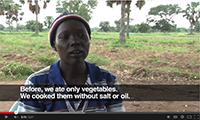Little was moving as we made our way along the dusty stretch of dirt road connecting Juba to Yei in the scorching mid-day sun.
By: Karen Sherman, Former Women for Women International staff member
Little was moving as we made our way along the dusty stretch of dirt road connecting Juba to Yei in the scorching mid-day sun. What should have been less than a two-hour drive took more than double the time due to the difficult terrain, which was more akin to a slalom course, requiring the driver to swerve from side to side to avoid large ditches and pot holes. Herds of goats and cows grazed by the side of the road while a handful of cars, motorcycles, and trucks – some ferrying soldiers, others daily commuters – rumbled onward.
Small groupings of grass and mud huts dotted the rural landscape. White markers denote areas previously cleared of landmines. Most of the villagers had sought some kind of shelter from the oppressive heat. Men gathered under traditional tukuls playing cards or drinking tea. Yet the women were out working, always working, carrying heavy loads of firewood, produce, or water on their heads in preparation for the evening meal; most had small infants swaddled around their backs. A typical day in South Sudan.
The vegetation grew denser and more varied as we approached Yei, with some areas appearing positively lush. Located within the Greenbelt Zone in Central Equatoria State, Yei River County is the new program site for Women for Women International in South Sudan. With a population close to 500,000 and few organizations providing gender-specific programs or services, Yei is home to many socially-excluded women who have significant potential to impact their families and communities.
Central Equatoria’s fertile land and consistent rainfall offer a promising opportunity for women to earn a sustainable income through agri-business and related sectors. In fact, the majority of households depend on crop farming or animal husbandry for consumption and livelihoods. Additionally, the state’s prime location at a major crossroads between Uganda and the cities of Yambio and Juba is ideal for women to access markets and trading routes to sell their products.
Central Equatoria is still recovering from decades of civil war, intertribal violence, and the influx of refugees fleeing conflict, mostly from neighboring Democratic Republic of the Congo. War has all but decimated the local infrastructure: 44% of the population lives below the poverty line, with an average income the equivalent of $8 per month[1]. Education and health indicators are among the lowest in the world, reflecting the impact of protracted conflict and limited provision of social services. The situation is potentially dire given the impending fiscal crisis in South Sudan.
Women, in particular, bear the brunt of these challenges. Female-headed households make up a significant percentage of the urban and rural poor. Women account for 84% of the population who are unable to read and write[2]. They encounter limited economic opportunities, assume a majority of domestic responsibilities, and face discriminatory cultural practices such land ownership rights and widespread sexual and gender-based violence, including rape and domestic violence. South Sudan’s Deputy Minister of Gender, Child and Social Welfare considers violence against women as one of the key contributing obstacles to the country’s development.
“No one thinks about the women,” says Jennifer, a prominent leader in a coalition of eleven women’s groups from the Mugwo Payam, or District, in Yei County. At a recent meeting, she and other women spoke openly about the hardships and humiliations that come with daily life. Men frequently attack women on the road to the market, taking their produce or animals by force or stealing the money from their pockets to buy alcohol, according to several in the group, most of whom had experienced violence firsthand.
The prevalence of HIV and alcoholism among men and women in the area is primarily attributed to poor education; however, poverty, frustration, and lack of hope and opportunity are large contributing factors. Educating women was considered the top priority by coalition members.
Although the women expressed strong interest in becoming active producers and community leaders, most lack the knowledge and skills to stand up for their rights and participate in the formal economy. Women for Women International addresses these challenges through its yearlong program, which integrates rights awareness and life skills with market-based skills and business training. With these skills, women rebuild their lives post-conflict and lead change in their families and communities. It is about creating voice and choice.
In South Sudan, as well as many other parts of the world, what women lack most is voice and choice. By investing in their social and economic empowerment, women gain the self-confidence, means, and status to advocate for their rights and contribute to public dialogue around critical issues of prosperity, peace, and stability – exactly what is needed to propel this new nation forward.
Learn more about how you can become involved in Women for Women International’s work in South Sudan.
[1]Key Indicators for Central Equatoria, 2010.The Republic of South Sudan National Bureau of Statistics.
[2]Key Indicators for Central Equatoria, 2010. The Republic of South Sudan National Bureau of Statistics.
 Watch the video of Women for Women International graduate
Watch the video of Women for Women International graduateHelen who explains how her life has been transformed through
the yearlong training.
